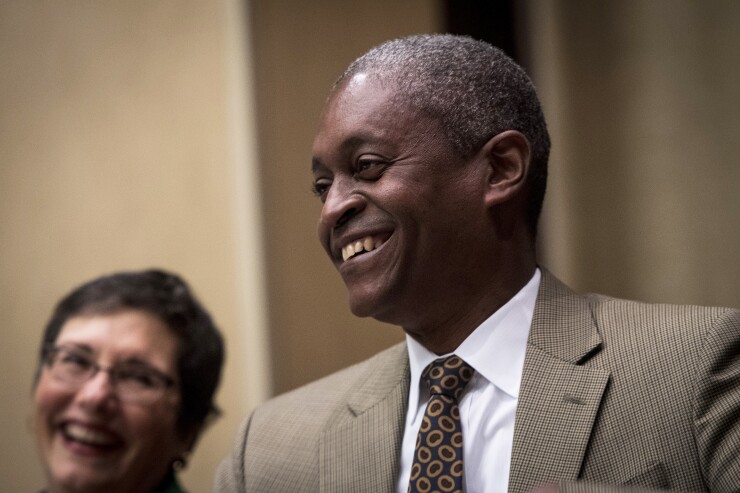The U.S. central bank should be patient as it raises interest rates this year, said Federal Reserve Bank of Atlanta President Raphael Bostic, adding his voice to other dovish comments from officials concerned by low inflation and the risk of an inverted yield curve.
“I am comfortable continuing with a slow removal of policy accommodation,’’ Bostic, who votes on policy this year for the first time in his Fed career, said Monday in Atlanta. “However, I would caution that that doesn’t necessarily mean as many as three or four moves per year.’’

Fed officials have penciled in three 2018 rate hikes, according to their latest median projections, after upgrading growth forecasts for the year following a $1.5 trillion tax cut signed into law by President Donald Trump on Dec. 22. Whether to accommodate this fiscal stimulus or lean against it by raising rates faster will be a key test for Fed Governor Jerome Powell, who was picked to replace Janet Yellen when her term as Fed chair ends next month.
Bostic, in his most dovish speech since taking the helm at the Atlanta Fed in June, said he only expected a modest bounce to growth from the tax measures. He later told reporters his base case for Fed hikes this year was “two to three, with the idea that data is going to come in to really inform how aggressively we can be moving our policy.”
Philadelphia Fed chief Patrick Harker said Jan. 5 he favored raising rates only twice this year while his St. Louis Fed colleague, James Bullard, indicated in a Jan. 4 interview on Bloomberg Television that he preferred to keep rates on hold.
Fed officials are looking for clues about the strength of underlying inflation in the U.S. and continuing to debate why price gains are so low, even with unemployment at 4.1 percent last month, the lowest level since 2000.
Bostic made clear that he was watching weak price pressures, which he said could be eroding the public’s confidence in the Fed’s ability to reach its 2 percent inflation target -- a goal it has missed for most of the past five years.
“My main concern is that inflation expectations risk becoming anchored below 2 percent,’’ he said. “‘If this happened, it would be increasingly difficult for the Fed to hit our 2 percent target.’’
He also echoed other recent comments from Fed officials in pointing to the flattening yield curve as a potential risk. The spread between two-year and 10-year Treasury notes has collapsed to the narrowest since 2007. Bostic said he would “do all I can to make sure our policy doesn’t invert the yield curve explicitly.”
Delivering an annual forecast to the Atlanta Rotary Club, Bostic said he expects moderate growth this year, aided by a small boost from the recent tax overhaul, as well as a pickup in housing, investment spending and strong consumer spending. The labor market is likely to continue to tighten and it’s been puzzling that wages haven’t shown a larger pickup, he said.
“I’m marking in a positive, but modest, boost to my near-term GDP growth profile for the coming year,” Bostic said. “For now, I am treating a more substantial breakout of tax-reform-related growth as an upside risk to my outlook.”





